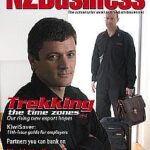Time for a Team Talk
Business owners often struggle to instil a team culture within their organisations and can have difficulty retaining and motivating workers. NZBusiness looks at ways to build a great team.
Business owners often struggle to instil a team culture within their organisations and can have difficulty retaining and motivating workers. NZBusiness looks at ways to build a great team.
Having difficulty motivating lazy staff members? Can’t extract another ounce of effort or initiative out of them, despite your best efforts? Tired of seeing your best people leave just when they seem to be getting the hang of the place?t sounds like you need to weave some team building magic into your business – and the sooner you start, the better.
It’s far from simply telling your people they make a great team and dressing them in common uniforms – it will take a considerable investment of time and money.
But the good news is that you will more than recoup your investment through increased productivity and lower staff recruitment costs.
So what do you need in order to build a great, high-performing team?
Gay Barton, general manager of HR specialist Drake New Zealand, says first it’s about choosing the right leader, someone who can lay the ground rules and give clear direction. That leader may be the managing director or business owner.
“It’s the leader’s job to create an environment where team members can do their best work. What makes a great leader is the right balance of task and relationship.”
Having the right orientation is another factor in building a great team. Task orientation is the ability to get the job done; relationship orientation is the ability to consistently moti-vate people to do their best work, says Barton.
“Leaders with a balanced task and relationship orientation know that the team is in place to deliver results for the business. They know that work gets done through people who are motivated – who know that they are doing important work and who know their work is appreciated.”
A high-performing team must also have a clear, unifying goal identified – without it, says Barton, people often work for their individual goals (such as a job promotion) in order to gain personal satisfaction.
“Teams without goals operate with higher stress levels, are more error-prone and are uncooperative,” she says. “That leads to frustration and, ultimately, to team breakdown.”
And third on the list to establishing a high-performing team is providing the tools and skills for the team, to ‘play well’. Barton says a good business team is similar to a good sports team. There are specific roles that must be filled to maximise success, and research has defined eight necessary roles within teams (see sidebox) – all of which can be defined through computer-based testing programmes. Drake’s P3 (Predictive Performance Profiling) programme is one such tool. P3 also helps organisations select the right candidate for a job in the first place, and demonstrates how that person will fit into an existing team.
Barton says there is no one ideal mix of roles that applies to every team as this is best set by the goal of the team.
“For example, when a project is subject to an extremely tight timeline, it is important to have the driving type present to ensure the team keeps running hard,” she says.
However, when the objective of the team is to make a significant impact in the marketplace – with a significant downside, should mistakes be made – the ‘critical judge’ type is important to be sure that anything that can go wrong has been thoroughly examined.
Meanwhile, if your business if experiencing a high churn rate of staff, Outward Bound’s Leadership programme business facilitator Greig Caigou believes it can be traced back to the need for positive reinforcement by workers.
“People need to know they are valued and part of something where their role adds value.
Too often managers themselves are under a lot of work pressure and they either take their fellow workers for granted or they don’t do the time alongside their staff,” says Caigou. His hot tip for managers and leaders is to “ask open-ended questions in series”.
“This actively engages a person in an interpersonal relationship – forcing the manager to listen to the answer so they can ask another question. Together this raises the level of understanding/appreciation of where a person is coming from.”
Caigou says they see many people crying out for meaningful feedback on how they’re going on their courses.
“To be valued lifts morale and is energising for the staff member – especially as they carry one set of learnings into new challenges and succeed.
“Self-awareness, optimism and empathy can enhance satisfaction and productivity at work and in other aspects of life,” adds Caigou. “Not only do we spend the largest portion of our waking time at work, but our identity, self-esteem and well-being are strongly affected by our work experiences.”
He says research suggests that organisations with a high number of emotionally intelligent leaders, managers and professionals are more likely to be the employer of choice and retain their best people.
Team building programmes
There is no shortage of team building and leadership programmes – so shop around.
Most programme providers will tailor-make a programme for your specific needs.
All of the providers NZBusiness spoke to agreed that senior management engagement is key to the long-term success of any initiative – and that includes enterprise-wide, departmental, or small business levels.
“If senior managers don’t understand what is expected of their teams through the programme, how would they be able to support and reinforce the process?” says AchieveGlobal’s Martin Percival.
“Prior to any skills development program, there needs to be an effective communication plan led by the senior team. This needs to indicate commitment from the leaders and articulate the reasons for the initiative – why are we following this path as an organisation and why should you put your energy into it?”
There then needs to be an effective training programme which follows an engaging adult learning process and addresses the necessary skills, says Percival.
“Following any formal training there needs to be an ongoing process of reinforcement and follow-up, ideally led by the managers. The real return on investment occurs following the training when the learning is being cemented and honed in real-world, practical scenarios. Managers need to ensure that this is happening or most of the learning will be lost.”
Outward Bound’s Greig Caigou agrees that management should be involved as shared experience provides valuable insights into the team for the manager, and allows team members to appreciate the common ground they all share.
“A key recommendation when implementing a team building programme is that rather than one-off events, the team engages in real tasks together that have meaning,” says Caigou. “Shared service, for example, has a group pulling together to add value to other people and engenders much more of a sense of ‘community’.
“At Outward Bound this could involve working as a group to set and clean up the evening meal for 100 other course participants or getting breakfast happening for everyone whilst on an overnight camp.”
When choosing a programme, Caigou’s advice is to provide a clear framework of what you are really trying to achieve in the team building activity.
“If it’s fun then make that clear and ensure the activity allows for inclusion of all or as many participants as possible. For example, too often team building events overlook say the unfit or non-active people.”
Fun and developing team member relationships are common themes, says Caigou. But often people can walk away from team building events having had a good time but no closer to understanding each other better.
“Ensuring there are identified and well communicated themes and learning objectives for a team building programme ensures everyone has some take-away learning, ideally things they can action straight away back at work,” he says.
“A focus, from first contact to the programme delivery and follow up on these outcomes are what stamps the mark on a quality programme at Outward Bound.”
The leadership factor
E Factor Training is one training provider that recognises that leadership skills and taking responsibility for ones own actions are qualities needed within the entire workplace.
Based at Long Bay, on Auckland’s North Shore, E Factor Training is a non-profit charitable trust and the corporate team building division of the Sir Peter Blake Marine Education & Recreation Centre (MERC). For its team building programmes it works to the ethos of Sir Peter Blake and his leadership skills.
“We recognise the fundamental reasons why he was a great leader and how we can mimic these philosophies within our programmes,” says MERC director Teresa Grant.
E Factor’s programmes are based around the following five key leadership attributes:
1. You need a great goal – and you need to believe in it. Great leaders have a vision, and they have the courage to pursue it with passion and determination. “If your vision or dreams don’t scare you, they are not big enough” (Sir Peter Blake)
2. Build a great team around you. To be able to achieve a great goal, you need a great team to help you along the way. A team of people working towards a common goal can be a lot more productive than somebody trying to go it alone.
3. Humility – Every person in a team is just as valuable as the next. No matter how important or famous you are, nobody in a team is too big for any job. An inspiring leader is someone who can support, coach and mentor people until they surpass him/her.
4. A great work ethic. To achieve greatness everything needs to be done to the best of your ability. As a leader you need to do everything in your power to make your team the best it can be.
5. Great determination and tenacity. “Never give up” – learn from your mistakes and never lose sight of your dream.
“E Factor translates team dynamics theory into practical applications which can then be transferred into the work environment to assist performance and achieve goals,” says Grant.
“Team dynamics is the unforeseen way in which a team works together, which either will cause positive or negative effects on the team and its results. Swapping team roles is an example of providing individuals with a glimpse of different leadership styles and creates an appreciation for how other team members work.
“And promoting effective communication, listening skills and strategic planning assists team members to think more laterally while finding solutions to challenges. Moving outside their comfort zone sometimes helps them to push themselves from within a circle of team support.” NZB
Websites relevant to this article: Drake– www.drakeintl.com Outward Bound– www.outwardbound.co.nz AchieveGlobal– www.achieveglobal.co.nz E Factor Training– www.efactor.co.nz




